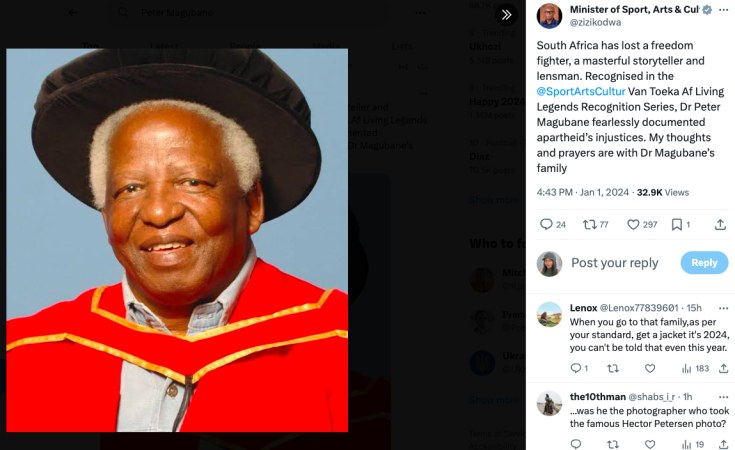Exhibit also reflects on the sigificance of the uprising for the present day
"If they had not fired shots, June 16 would not have been as black a day as it turned out to be," Mike Mzileni is quoted in a caption to a photograph in the 1976/360 exhibition at the University of Cape Town (UCT).
The exhibition not only marks the forty-year anniversary of the 16 June uprisings, but also considers the significance that 1976 has for today's youth.
Consisting of video installations, artwork, and at its core, the iconic photographs of Sam Nzima and Peter Magubane, the exhibition takes the viewer from Soweto to Cape Town to UCT.
Curated by Paul Weinberg, a documentary photographer and senior curator at UCT's Centre for African Studies (CAS) Gallery, along with Nkululeko Mabandla, a MK veteran and researcher at CAS, it moves from documentary photographs to representations in art. Finally, it addresses the current national dialogue on 1976.
Peter Magubane's images form the backbone of photographs from Soweto. The exhibition also launches Magubane's latest book, June 16. Magubane's images of students fleeing from the police, of a young woman crying out in pain after being hit by a bullet in her stomach, of men armed with only stones and dustbin lids against the riot police, rivet the viewer.
Sam Nzima's iconic image of Mbuyisa Makhubu carrying Hector Pieterson also features, along with other powerful and lesser known images by Nzima such as an image of a black policeman shooting at protesters.
A wall dedicated to "remembering the fallen from the 1976 uprisings" displays the names, ages, places and causes of death of the victims. Many of the dead are young, but the youngest is 4-month-old Richard Khalipha, who died on 15 January 1977 in Nyanga.
Between the two long lists of names is Juhan Kuus's disturbing photograph of a policeman smoking a cigarette while dragging a man who has been shot.
The images of protests in Cape Town feature less famous but no less powerful images such as John Paisley's photograph of policemen playing soccer with students in Langa and a photograph of black female protesters who shouted black power slogans and said, "We will die with our black brothers."
One of the video installations is a series of interviews with people connected to UCT - academics, past students and staff who lived through the 1976 uprisings. In their reflections on their experiences at the "little Moscow on the hill", they are asked about student protests in the present.
Peter Buckton, UCT sports co-ordinator, who was 23-years-old and living in Manenberg in 1976, said that "the sad part of the whole legacy of 1976" is that, for many young people, their lives haven't improved a lot.
Elelwani Ramugondo, senior lecturer at the Faculty of Health Sciences at UCT, echoed this when she said: "Young people are saying, 'What have you left us with?'"
Artist Keresemose Richard Baholo's Stop the Killings is also included and shows protesters on the Jameson Steps holding placards as they are beaten by the police.
The final stage of the exhibition is a video installation entitled "national dialogue" in which former South African Defence Force conscripts and activists who were involved in the 1976 protests spoke about their experiences during 1976 as well as issues of "reconciliation, healing and reparations".
The exhibition runs until 16 August 2016 at the CAS Gallery, UCT. Tel: 021 650 2308


